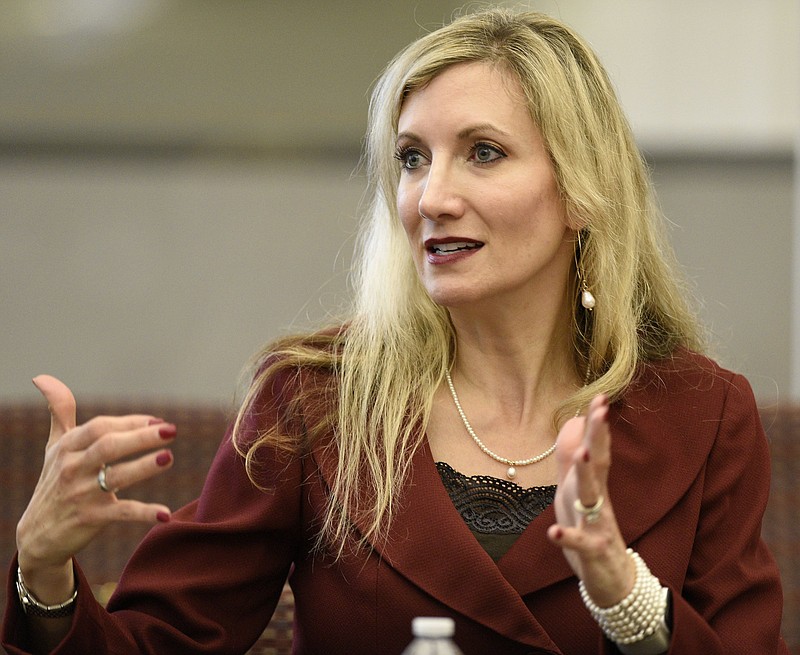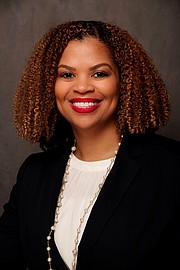A pledge for racial equity developed by the Chattanooga Area Chamber of Commerce has drawn about 40 business leaders' signatures, as well as some criticism that the work falls outside the mission of the economic development organization.
"Tangentially it might help some businesses, but it's not their primary job to reorient the culture," said Doug Daugherty, the president and founder of local conservative organization Hamilton Flourishing. "We're supporting them to recruit business. If they're not doing that, what are they doing?"
Christy Gillenwater, CEO of the chamber, said she has heard from detractors about the pledge and has had some productive conversations with critics.
"This is not a political discussion. It's about talent and economic development and moving our city forward," she said. "It's our job to bring these kinds of things to light."
The move toward this work began more than three years ago, with feedback from participants in the Velocity 2040 visioning process, Gillenwater said.
"We heard loud and clear that people want a more inclusive economy," said Gillenwater, who added that nearly 5,000 area residents provided input on the goals and priorities of that plan.
Workforce and talent development is particularly connected with expanding racial equity and inclusion across industries, Gillenwater added. The Chamber has about 1,800 member businesses across economic sectors.
"We heard employers say this is important to us to attract and retain talent, and if the chamber would lead - create content we can bring to life within our places of business - that will make our jobs easier," Gillenwater said.
A 2018 report from the W.K. Kellogg Foundation, "The Business Case for Racial Equity," lays out a compelling case for the long-term economic effects of addressing racial inequities, said Lorne Steedley, the chamber's vice president of diversity and inclusive growth.
The United States economy could be $8 trillion larger by 2050 if the country eliminated racial disparities in health, education, incarceration and employment, according to the report.
"It's looking at the relationship between institutions denying folks that full access, and the impact on the market and economy, and looking at the implications of that to all of us," Steedley said.
The wealth gap between Black and white families is an example of the long-term effects of racial inequity, he said. For example, the report shows that in 2016, 71% of whites and 41% of Blacks owned their own homes.
"If you close the wealth gap, it also opens itself up to more consumer spending, and provides an environment, and Chattanooga becomes a destination for opportunity," Steedley said.
A 2019 report as part of Velocity 2040 showed the racial gap in household earnings in Hamilton County is 30 percent greater than in the country as a whole, with the typical white household in Chattanooga earning twice as much as the average Black household.
Chattanooga is competing globally for skilled workers to help companies grow, and working to correct inequity makes Chattanooga a more competitive business destination, Steedley added.
"You're not drawing just from the region, you're also competing with the rest of the world," he said. "How do you become more attractive to a broader segment of the population?"
The pledge includes a commitment to "educate ourselves and share the history of systemic racism in Chattanooga and Hamilton County and the barriers that continue, so that as we recognize them, we can find new ways to overcome them."
More information
The pledge: bit.ly/ceo-pledgeSignatories: bit.ly/who-signedFAQ: bit.ly/pledge-faq
It also includes a pledge to "improve the employment, training, advancement, support, and success of people of color in our workforces."
Daugherty said he has concerns about conflating access to opportunity and ensuring success based on race.
"Everybody should have an equal opportunity, but that's not the same as outcome," he said. "This document actually puts the two together."
The Chamber began circulating the racial equity pledge last week, encouraging local business leaders to sign on, and there will be a broader push in the coming weeks, Gillenwater said. The list will become the foundation of a group that works together to find ways to advance equity, she said.
"Systemic racism is like air pollution in communities in terms of the fact that these challenges exist in all communities," she said. "The document is meant to bring together businesses and their CEOs who want to make positive change."
Mayor Tim Kelly, who has also signed the pledge, said years of systemic racism have "split us over time into two cities, in which one city has not shared in the rising prosperity experienced by the other."
"But it's not just a moral problem, it's an economic problem," he said. "This issue is holding us back from economic progress."
Eric Fuller, CEO of U.S. Xpress and the head of the chamber's CEO roundtable, said the pledge is about building stronger businesses.
"The council is rolling out great programming across the organization to get folks more involved and engaged in these important conversations," he said.
Janelle Reilly, market CEO for CHI Memorial, said the pledge is "is absolutely in alignment with the chamber's mission and purpose."
"We need to ensure everybody can participate and has an equal opportunity to participate in a thriving economy," she said.
Working in diversity and inclusion means contending with different perspectives and opinions on complex topics, said Valoria Armstrong, who is chamber board chair and chief inclusion officer and vice president of external affairs for American Water.
"I think at the end of the day we all want the same thing for Chattanooga, and that is to continue to grow and attract talent and have a culture of inclusion."
The conversation about racial equity in business comes as Republican lawmakers in the Tennessee Legislature moved this week to ban public schools' teaching of certain concepts involving systemic racism.
The bill would allow state education officials to withhold funding from any school promoting or including certain concepts in the curriculum or any supplemental instructional materials.
Among those concepts are the idea that "this state or the United States is fundamentally or irredeemably racist or sexist," and the assertion that "an individual, by virtue of the individual's race or sex, is inherently privileged, racist, sexist or oppressive, whether consciously or unconsciously."
Contact Mary Fortune at mfortune@timesfreepress.com. Follow her on Twitter at @maryfortune.

